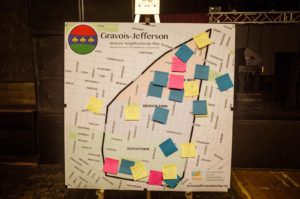What part of the food system do you work on?
We are a nonprofit organization that works to build a stronger, more equitable neighborhoods. Rise is a nonprofit developer and development consultant that provides predevelopment lending and capacity-building technical assistance and training to other nonprofit community development organizations (CDCs), government agencies and institutions in the St. Louis metropolitan area. Rise also plays a leadership role in community development policy and affordable housing advocacy locally and throughout Missouri and Illinois.
With a focus on sustainable success, we strive to create stronger communities and more desirable places to live. We help turn neighborhood visions into realities of vibrant living areas that attract people and small businesses. By pursuing opportunities to help foster thriving communities and local economies in St. Louis, we help advance the regional economy.
We work not just in housing, but also in community development. The part that I have taken the lead in is finding ways to better address the local/regional food system. In many neighborhoods we work in, there is not a lot of investment in healthy food options and grocery stores. Even in many stores, there’s not many options. This is what I refer to as the four A’s: Awareness, Availability, Accessibility, and Affordability.
What other organizations in STL does your organization work with on food issues?
We work with the city on many aspects. A few years ago, the city of St. Louis wanted to target a portion of its funding to address the closing of the Schnucks grocery store up on Grand in North City through funding under the Community Development Block Grant program. Alana Green from the city’s Community Development Administration asked for some recommendations on what to do to help address food deserts. We helped create an appropriation of funding from the City to help address the public benefit objective. The efforts aligned with the City of St. Louis’ Sustainability Plan and the Mayor’s Obesity Reduction Plan. We worked hard to align both of those plans to create alternative channels for healthy food to better distributed into northern section of the city to help reduce the impact of food deserts in that area.
There was some funding granted about four years ago but not enough to really sustain efforts through the proposals that were submitted. We tried to tie the funding to social innovation opportunities. We tried to attract another grocery store or some smaller store to help advance the Healthy Corner Store Project. We didn’t receive many innovative approaches.
Any projects in the works?
Right now we are developing a community plan for what we call the the Gravois Jefferson Historic Neighborhoods area, an area in south city that is bordered by Jefferson to the east, Gravois and Grand to the west, and Meramec to the south. It encompasses Benton Park West, Gravois Park, and a northern portion of Dutchtown neighborhoods. The plan will involve eight different focus areas. One relates to health services that encompasses the food system. We are trying to find the best way to address and coordinate access for more sustainable food systems. For example, we are trying to find ways of assessing current grocery stores, such as how do we raise the quality of products within those grocery stores? How do get healthier food options in those corner stores? Hopefully the plan will be adopted by the city and therefore leverage resources to help support goals within the plan.
Where do you see the future of STL’s food system?
Well I’m hoping that the food system in St. Louis becomes more organized. I hope we can build buy-ins and collaboration from local governments and local community leaders to support and expand the food system in order to change the socio-economic trajectory of where we are going. There are certain cities that are doing phenomenal work, such as Milwaukee, Chicago, Louisville, and Seattle. So I hope that St. Louis will become one of those leaders in local food system planning. The major thing for me is that we address health issues in those zip codes where we see the highest levels of obesity. Obesity leads to chronic diseases such as diabetes, heart disease, and some forms of cancer. These issues adversely impact the local African-American population the most. So I’m hoping the food system can better address these social and health equity issues.
Back in 2015 I attended the American Planning Association in Seattle, Washington and I presented on St. Louis’ food system and shared data on the challenging barriers as it relates to our marginalized and disinvested communities and what we were doing to improve the situation. I discussed the need for a food council that would coordinate and help advocate for ordinances and also the food system in the St. Louis region, which has become the St. Louis Food Policy Coalition.
What do you do outside of your job that supports the local food system?
In 2015 during my first year term as President of Alpha Phi Alpha Fraternity we partnered with the O’Fallon Park Rec Complex YMCA to launch a coordinated summer farmers’ market that served the O’Fallon neighborhood and North St. Louis community. It was the only farmers market north of the city. We sponsored it the first Sunday of every month and brought educational material that related to healthy eating to show residents how to support local food, how to prepare food in a way that is healthy and also tasty, and how to lower their food costs.
Check out Rise’s Website and Facebook Page!



